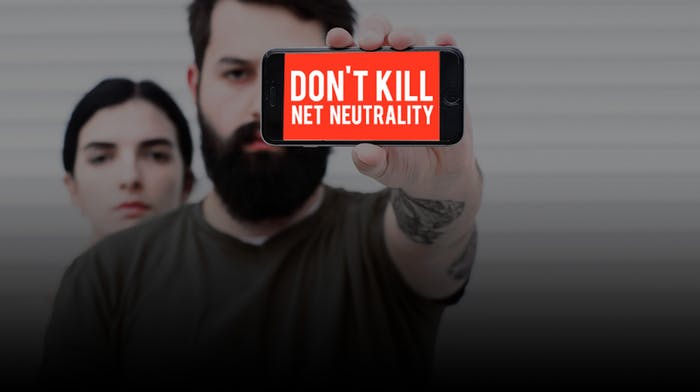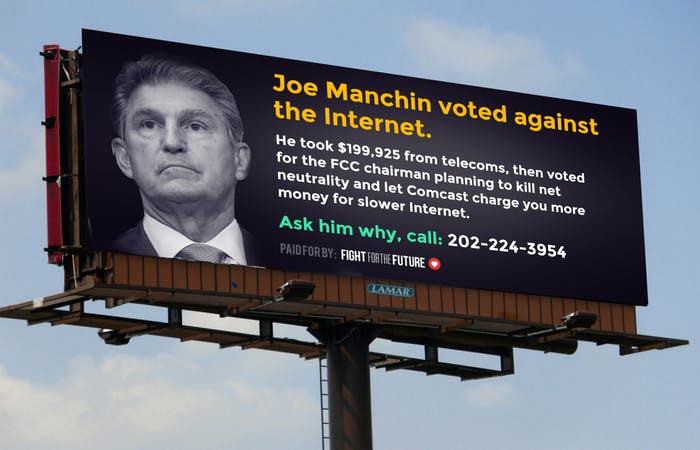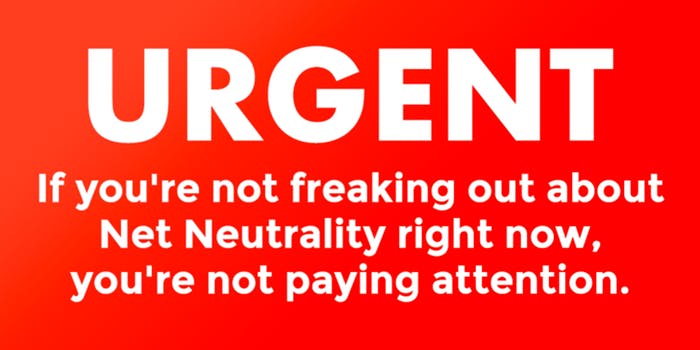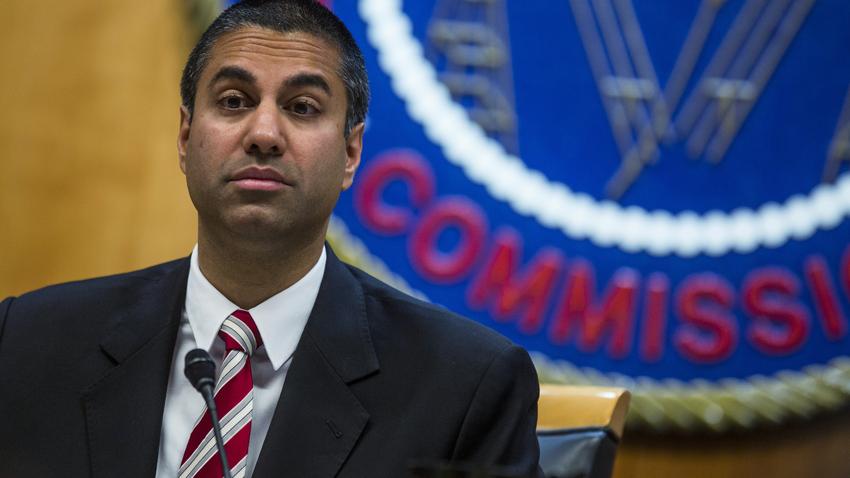Net Neutrality and The Mercy Center
The MERCY Network needs Net Neutrality
Take ACTION! The FCC will end Net Neutrality unless millions act to save it. We urge you to join and promote protests at Verizon stores on December 7, and share this web page far and wide.
6 Ways You Can Protest the FCC’s Decision to Kill Net Neutrality | Organizations are now planning a series of events to put pressure on Congress and Ajit Pai, chairman of the commission. The Federal Communications Commission revealed plans on Tuesday to dismantle net neutrality, which would lead to internet speeds being controlled by few very corporations. Organizations are now planning a series of events to put pressure on Congress and Ajit Pai, chairman of the commission.
“The only interests Ajit Pai represents are those of the few gatekeeper media companies that want to charge people more for nothing and give them less of everything,” said Candace Clement, Free Press Action Fund Campaign Director, this week. Also amusingly, Pai seems to think the same sort of regulation adopted during the Clinton years — when dial-up modems were king and America Online used 56k modems for “fast” internet speeds — would be OK to have some 20 years later. Get ready to go back to speeds like this for independent websites, basically. Activists — and really anyone who’s spent more than five minutes thinking about the effects of a tiered internet where not all web content is created equal — realizes this: When only a few big corporations, of which you can count on one hand, control which web content loads fast and which loads slowly, “light-touch regulation” doesn’t protect any American, especially those who want to start the next reddit or Netflix or YouTube. Pai, it should be noted, was a lawyer for Verizon before going into government. Verizon released this strange video in May, touting the benefits of killing net neutrality. Activist groups are now taking their fight to their representatives in Congress, who will vote on the commission’s proposals on December 14. * Read >> MORE >>Take ACTION!

Verizon Store Protests on December 7 | At Verizon stores nationwide on December 7, one week before the vote, activists will meet at 5 p.m. local time to put pressure on Congress and demand a change. Pai used to work on Verizon’s legal team, so the choice of store is intended to “[shine] light on the corruption” and expose Pai’s conflict of interest. * Act >> NOW! >>

Billboards in Congressional Districts | Activist group Fight for the Future is hosting a campaign to place billboards informing voters about their representatives’ actions. The campaign will target members of Congress that voted in favor of President Donald Trump’s proposed choice of Pai as head of the FCC. This includes the four Democrats Joe Manchin, Claire McCaskill, Gary Peters and Jon Tester. The campaign is around halfway toward its $100,000 funding goal. * Act >> NOW! >>
Washington, D.C. Protest on December 13 | On December 13, the day before the vote, a team of organizers called “Defend Net Neutrality” have planned a protest from 10 a.m. to 2 p.m., with a venue as-yet undecided. * Act >> NOW! >>
Phone Call Drive Happening Now | Citizens can call their representative by using Battle For the Net’s simple interface. Entering your phone number provides a script of what to say and connects you with your local politician. Over 250,000 calls have already been made. * Act >> NOW! >>
ResistBot | Texting resist to the number 504-09, a bot will ask for your name and other info. It then sends a message to your senators, representatives, governor and the President. The team is collecting donations to fund the cost of sending out letters as part of the campaign. * Act >> NOW! >>
More on net neutrality by Wired >> * Read >> MORE >>

Petitions
A petition | entitled “Replace Ajit Pai on FCC, Restore Net Neutrality, Make Last-mile Networking a Public Utility, and Stop Corporate Abuse” has been posted on the official White House website. At time of writing, the petition has 6,474 signatures, with 93,526 required to get a response from the government. * Act >> NOW! >>
Another petition | entitled “Do Not Repeal Net Neutrality,” has been posted and already acculumulated a staggering 143,229 signatures. * Act >> NOW! >>
FCC Wants to Kill Net Neutrality. Congress Will Pay the Price
|
 FCC chair Ajit Pai’s plan to repeal net neutrality provisions and reclassify broadband providers from “common carriers” to “information services” is an unprecedented giveaway to big broadband providers and a danger to the internet. The move would mean the FCC would have almost no oversight authority over broadband providers like Comcast, Verizon, and AT&T.
For years, those broadband providers have used lawsuits and agency filings to fight FCC oversight and overturn its authority to prevent net neutrality abuses. But never in those companies’ most feverish dreams did they expect an FCC chair would propose to demolish all net neutrality protections and allow ISPs to extract tolls from every business in the country.
Even industry analysts who expected the reclassification of broadband providers from Title II common carriers to Title I information services were stunned. Following Pai’s announcement, independent cable analyst Craig Moffett sent out an email to investors entitled "Shock and Awe and Net Neutrality," writing, “We've known since the election that the FCC would reverse Title II. But we never expected this. Yesterday’s FCC Draft Order on Net Neutrality went much further than we ever could've imagined in not only reversing Title II, but in dismantling virtually all of the important tenets of net neutrality itself.”
FCC chair Ajit Pai’s plan to repeal net neutrality provisions and reclassify broadband providers from “common carriers” to “information services” is an unprecedented giveaway to big broadband providers and a danger to the internet. The move would mean the FCC would have almost no oversight authority over broadband providers like Comcast, Verizon, and AT&T.
For years, those broadband providers have used lawsuits and agency filings to fight FCC oversight and overturn its authority to prevent net neutrality abuses. But never in those companies’ most feverish dreams did they expect an FCC chair would propose to demolish all net neutrality protections and allow ISPs to extract tolls from every business in the country.
Even industry analysts who expected the reclassification of broadband providers from Title II common carriers to Title I information services were stunned. Following Pai’s announcement, independent cable analyst Craig Moffett sent out an email to investors entitled "Shock and Awe and Net Neutrality," writing, “We've known since the election that the FCC would reverse Title II. But we never expected this. Yesterday’s FCC Draft Order on Net Neutrality went much further than we ever could've imagined in not only reversing Title II, but in dismantling virtually all of the important tenets of net neutrality itself.”
Neutrality Matters
More On Why Net Neutrality Matters
WATCH: This Video Breaks Down Why Net Neutrality Matters | Mic explains why equal access to the Internet is important—and how the FCC is threatening that access. President Donald Trump-appointed Federal Communications Commission (FCC) head Ajit Pai is attempting to roll back net neutrality rules, which prevent well-funded websites from paying to make their content easier to access than their smaller competitors. As Representative Keith Ellison (D-Minn.) wrote for The Huffington Post back in 2014: An open Internet protects opportunities for communities of color. It lets people report on injustice and organize to confront it. An open Internet helps people of color launch businesses online, with lower startup costs than entrepreneurs often face. It lets artists and creators tell their own stories, rather than depending on traditional media to decide which stories are worth telling. * Read >> MORE >>
To Save Net Neutrality, We Must Build Our Own Internet | We must end our reliance? on big telecom monopolies and build decentralized, affordable, locally owned internet infrastructure. The Federal Communications Commission will announce a full repeal of net neutrality protections Wednesday, according to the New York Times and several other media outlets. It is possible that a committee of telecom industry plutocrats who have from the outset made it their mission to rollback regulations on the industry will bow to public pressure before Wednesday, but let’s not count on it. It is time to take action, and that doesn’t mean signing an online petition, upvoting a Reddit post, or calling your member of Congress. Net neutrality as a principle of the federal government will soon be dead, but the protections are wildly popular among the American people and are integral to the internet as we know it. Rather than putting such a core tenet of the internet in the hands of politicians, whose whims and interests change with their donors, net neutrality must be protected by a populist revolution in the ownership of internet infrastructure and networks. * Read >> MORE >>
How Internet Co-ops Can Protect Us From Net Neutrality Rollbacks | Smaller internet service providers offer alternatives and could disrupt the monopolies. In 2011, brand new fiber optic cables lit up for the first time across the forested terrain of the Ozarks and up and down the farmlands of central Missouri. Here among the hickories and red oaks, you might expect to be in the land that the internet forgot. That’s what it could have been, had residents not decided to stop waiting on large for-profit telecommunications companies. They built their own internet instead. They turned to their electric utility for a solution, and Co-Mo Electric Cooperative, established in 1939 to bring power to the region’s farms, answered the call. “What got the project off the ground was the membership demand,” said Randy Klindt, who at the time was the general manager of Co-Mo Connect, the co-op’s internet branch. “The members all drove it from the grassroots. They went door to door. They paid their neighbors’ $100 deposit.” Later at a community meeting, a local bank surprised the room by paying the deposit of everyone present. They quickly crowdfunded enough money to begin construction, and in 2011, just before Christmas, its first members came online. * Read >> MORE >>
Are You Ready to Pay For Porn?
If Net Neutrality is repealed, our internet service providers will have the power to charge us for porn and we aren’t prepared for the consequences. | The FCC recently introduced a plan to repeal Net Neutrality. Depending on who you’re reading about what that entails, there are theories of meticulously controlled media exploiting consumers through upcharges and dismissive claims of free market giving consumers advantages.
The latter is debunked when rural markets, who often only have single providers of any utility, are considered?—?there is no market competition in rural markets. If you’re conservative and believe that there is a liberal bias in media and happen to live in a rural area, this ought to be your worst nightmare. It conjures up scenarios of the Chinese government banning Google or Orwellian nightmares. For the sake of simplicity, let’s consider just one product we take for granted online: porn.
Your grandma probably watches porn | Porn may not seem like a big deal compared to all the possible ways your internet use can be controlled, but let’s back up and talk about the volume and ubiquity of porn. Today most porn is watched on a cell phone. You could be huddled in the dark next to your snoring, unsuspecting partner watching big beautiful geriatric women dominate an immobilized party with a Batman™ theme using fidget spinners. You could be on a plane, boat, work retreat, or in a confessional with your priest and watch something entirely uncouth for me to describe. Not only would it be so convenient that it would seem personally designed for your lifestyle, but it’s free. Porn is argued to comprise 37% of the data on the internet and some saying a conservative 30%.
Nobody is paying for all that porn | This is all incredibly impressive and huge on its own. Its economic impact is unquestionably influential in the US. What’s even more startlingly, and will likely shock you less, is only 4% of people pay for it. Have you paid for porn? Many of us have been spoiled by torrents, streaming sites, and pirating to get free content. Arrgggghhh matey!
You’ll have to pay and be identified by your porn habits
How your internet provider can begin filtering or throttling content. | If Net Neutrality is repealed, you’ll more than likely have to pay for porn again. Net Neutrality prevents an internet service provider from charging you based on what you’re looking at, changing speeds based on what you’re looking at, or blocking what you look at all together. Ending porn isn’t very profitable for them. Why not simply hold your desires hostage till the ransom is paid?
Ashley Madison, a dating website for anonymous people, was hacked and the identities of its members released. The hackers were trying to expose people cheating on their marriages and inadvertently outed and endangered gay people in countries where gay sex is punishable by death. It’s not an outlandish or absurd thing to imagine hackers pilfering the sexual habits of a cable company’s customers?—?it’s happened before. We’re a private species that would rather our coworkers, friends, relatives, and society at large be unaware of our sexual proclivities. * Read >> MORE >>
FCC Doubles Down on Its Dead-Wrong Definition of How the Internet Works | The Electronic Frontier Foundation and nearly 200 experts explain basically from first principles how the internet works and why it should be defined as telecommunications. The FCC dismisses these scholars and founding technologists of the internet in a footnote. In May, when the FCC released an early draft of its plan to undo 2015’s strong net neutrality rules, I pointed out that its case rests almost entirely on a deeply incorrect definition of how the internet works. There can be no mistake now that this misrepresentation is deliberate; the agency has reiterated it in even stronger terms in the final draft of the proposal. I’m not going to go into great detail on it (my earlier post spells it out) but the basic problem is this: broadband has to be defined as either an information service or telecommunications service. The first is “the offering of a capability for generating, acquiring, storing, transforming, processing, retrieving, utilizing, or making available information,” while the second is “the transmission, between or among points specified by the user, of information of the user’s choosing, without change in the form or content of the information as sent and received.” * Read >> MORE >>

